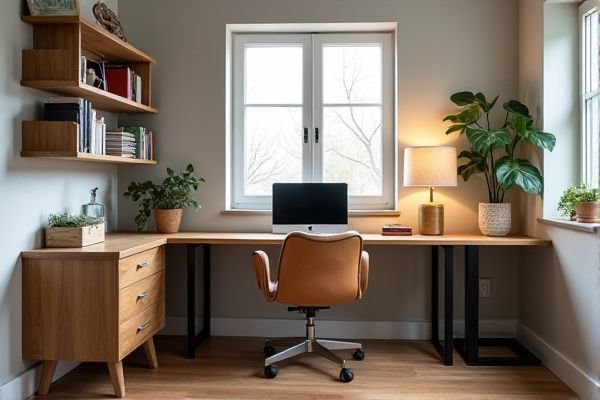
Rolling desks offer enhanced mobility and flexibility, allowing you to easily rearrange your workspace to suit different tasks or accommodate multiple users, whereas fixed desks provide greater stability and often support heavier equipment with a more permanent setup. Explore the rest of the article to determine which desk type aligns best with your work style and environment.
Table of Comparison
| Feature | Rolling Desk | Fixed Desk |
|---|---|---|
| Mobility | High - easily movable | Low - stationary |
| Flexibility | Can be repositioned as needed | Permanent placement |
| Installation | No installation required | Often requires assembly or mounting |
| Stability | Moderate - may shift when moved | High - stable and sturdy |
| Space Efficiency | Adaptable to different layouts | Fixed footprint |
| Cost | Generally higher due to casters | Typically lower |
| Maintenance | Requires checking wheels and locks | Minimal |
Introduction to Rolling Desks and Fixed Desks
Rolling desks feature caster wheels that enable easy mobility and flexible workspace arrangements, ideal for dynamic office environments. Fixed desks offer stable, stationary setups that provide consistent support and durability, suitable for dedicated workstations. Your choice depends on whether adaptability or permanence best suits your workflow needs.
Key Features of Rolling Desks
Rolling desks feature lockable caster wheels that enable easy mobility across various workspaces, allowing you to quickly adjust your office layout. Their adjustable height and swivel capabilities enhance ergonomic comfort and promote dynamic work habits. These desks often include built-in storage options for improved organization and accessibility during tasks.
Key Features of Fixed Desks
Fixed desks offer stability and durability, featuring a solid frame and sturdy tabletop ideal for heavy equipment and prolonged use. These desks typically boast a larger surface area and integrated storage options, such as drawers or shelves, to keep your workspace organized. Designed to remain stationary, fixed desks provide a reliable and consistent setup that supports productivity without the movement of rolling components.
Mobility and Flexibility Comparison
Rolling desks provide superior mobility with caster wheels allowing effortless movement across different spaces, ideal for dynamic work environments. Fixed desks offer stability and are better suited for permanent setups where consistent placement supports task organization. Your choice depends on whether you prioritize flexible workspace arrangements or a stationary, sturdy workstation.
Space Optimization and Office Layout
Rolling desks enhance space optimization by allowing flexible movement and easy reconfiguration of office layouts, enabling seamless adaptation to different tasks and team collaborations. Fixed desks provide stability and defined personal work zones but limit spatial rearrangement, potentially reducing overall office flexibility. Incorporating rolling desks supports dynamic office environments and maximizes usable space, especially in compact or multi-purpose areas.
Ergonomics and User Comfort
Rolling desks offer superior ergonomics by allowing users to easily adjust their workspace position, promoting better posture and reducing strain during prolonged use. Fixed desks provide a stable and consistent surface, which can enhance user comfort by eliminating movement distractions, but may lack flexibility for varied ergonomic needs. Your choice depends on whether mobility or stability better supports your ergonomic preferences and comfort requirements throughout the workday.
Durability and Stability
Fixed desks generally offer superior durability and stability due to their solid construction and lack of moving parts, making them ideal for heavy use and long-term reliability. Rolling desks provide portability and flexibility but may sacrifice some stability, as wheels can wear down or shift over time, potentially reducing overall sturdiness. Your choice should weigh the importance of stable, durable workspace versus the convenience of mobility.
Cost and Value Analysis
Rolling desks typically offer greater flexibility and mobility at a slightly higher initial cost compared to fixed desks, but their versatility can enhance productivity and space utilization, providing better long-term value in dynamic work environments. Fixed desks often have a lower upfront price and offer robust stability, making them ideal for static workstations with minimal need for rearrangement. Your choice should balance budget constraints with the need for adaptability, as rolling desks may reduce future costs related to office reconfiguration.
Best Use Cases for Rolling and Fixed Desks
Rolling desks excel in flexible work environments where mobility and quick reconfiguration are essential, such as collaborative offices, classrooms, or remote workspaces requiring frequent adjustments. Fixed desks provide enhanced stability and larger surface areas, making them ideal for intensive tasks like detailed drafting, heavy computing setups, or long-term workstations in home offices. Your choice depends on whether you prioritize adaptability with rolling desks or durability and space with fixed desks.
Choosing the Right Desk for Your Needs
Selecting between a rolling desk and a fixed desk depends on your workspace flexibility and mobility requirements. Rolling desks offer easy repositioning and adaptability, ideal for dynamic environments, while fixed desks provide stability and often a larger surface area for intensive tasks. Consider the balance between mobility, durability, and space when choosing the right desk to optimize productivity and comfort.
 homyna.com
homyna.com